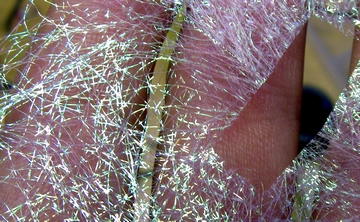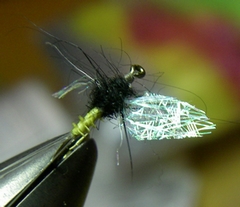Domestic bliss shattered by my failure to iron shirts, but as it was for Science, it’s a worthy martyrdom.
Angelina fibers are available in a heat fusible flavor, insert a pinch of fibers into a paper napkin, pass an iron over them a couple times and the of fibers fuse flatly to each other, yielding a “Tyvek” style mesh cloth.
 This fabric is only as strong as the volume of fibers used and the degree of their overlap. Additional experimentation is required to find the best pattern to melt; parallel fibers, cross-hatched, further testing is needed to determine what proves strongest.
This fabric is only as strong as the volume of fibers used and the degree of their overlap. Additional experimentation is required to find the best pattern to melt; parallel fibers, cross-hatched, further testing is needed to determine what proves strongest.
One look at the result and about 75 different uses pop into your head, so allocate some time to fiddle.
Mayfly wings was the first thing I saw – the opalescent hue looks just like a shiny spinner wing. I trimmed a set for a #18 hook and managed to secure it without too much trouble. They are light and flexible wings – they will bend in flight rather than remain rigid and “helicopter” the tippet.

The photo shows what happened after I gave it a good yank. The direction of the original fibers when fused will have to be tinkered with so they don’t tear out. A #18 hook doesn’t give much area to tie down, the wing frayed badly when abused.
The intact wing shows the effect of the fabric trimmed to a shape, I folded the material and cut both wings at the same time, leaving a narrow adjoining section to tie to the hook. That was my mistake, as the narrow “neck” between the wings did not have many fibers secured. When pulled, the wing slowly fragmented into oblivion. Visually it’s a nice wing effect, but durability requires us to test further.
My next attempt was to roll up some fabric into a cigar shape then trim to the proper length once attached – exactly as a polypropylene yarn spinner is tied. I figured more fibers would be secured in the small tie down area and the wing should hold together much better.
The result is depicted above, after I mauled them badly trying to pull them apart. The fibers separated a little bit but that was the only evidence of damage. Like all good flies the more it’s eaten – the better it looks.
The above pattern is what we used on Fall River and Hat Creek for the Trico spinner falls, when the solid black flavor didn’t yield any fish we switched to this variant – it went by many names, mostly we called it a “female Trico.”
Now I just call it “too damn small for me to see” – along with every other fly smaller than an #8.. I will debut these this weekend on the foam line just for the fun of it – assuming I get out of the Doghouse by then.
del.icio.us Tags: trico spinner, angelina fibers, mayfly spinner, Hat Creek, Fall River

Pingback: SingleBarbed Risks Relationship, Continues Experiments With Heat Fusible Wing Material : The Trout Underground Fly Fishing Blog
Keith,
Neat web site you have here.
Thanks Cody, I’ll put a good word in for you with Poppa.
Keith,
Have you played with the Triple Wing Spinner for Tricos yet?
We used to tie a fly called the “Gob O’ Spinners” for Fall River, it was a #14 that you mounted 8 or 9 spinner wings on to simulate a clump of bugs, rather than an individual fly.
I’m not familiar with the Triple Wing flavor, is there an example somewhere on the web?
I just did a quick google image serch and couldn’t come up with a picture of the pattern. It’s a Greg Ellis pattern that was featured in Kelly Galloup’s book “Cripple’s and Spinners.” Really simple to tie. Basically it’s a standard spent spinner but with 3 wings tied in to give a more realistic wing profile, especially for Tricos where there wing width is like 60% of the length of their body length. I’ll take some pics of one of mine tonight